Greta Thunberg: How a teenager became the face of the fight against the climate crisis in three short years
In August 2018, a schoolgirl began her own ‘climate strike’, sitting outside the Swedish parliament. Today the ‘Greta Effect’ has galvinised millions around the globe to call for urgent action – at Cop26 in Glasgow she’ll find out whether the world’s leaders have started listening, writes Sean O’Grady

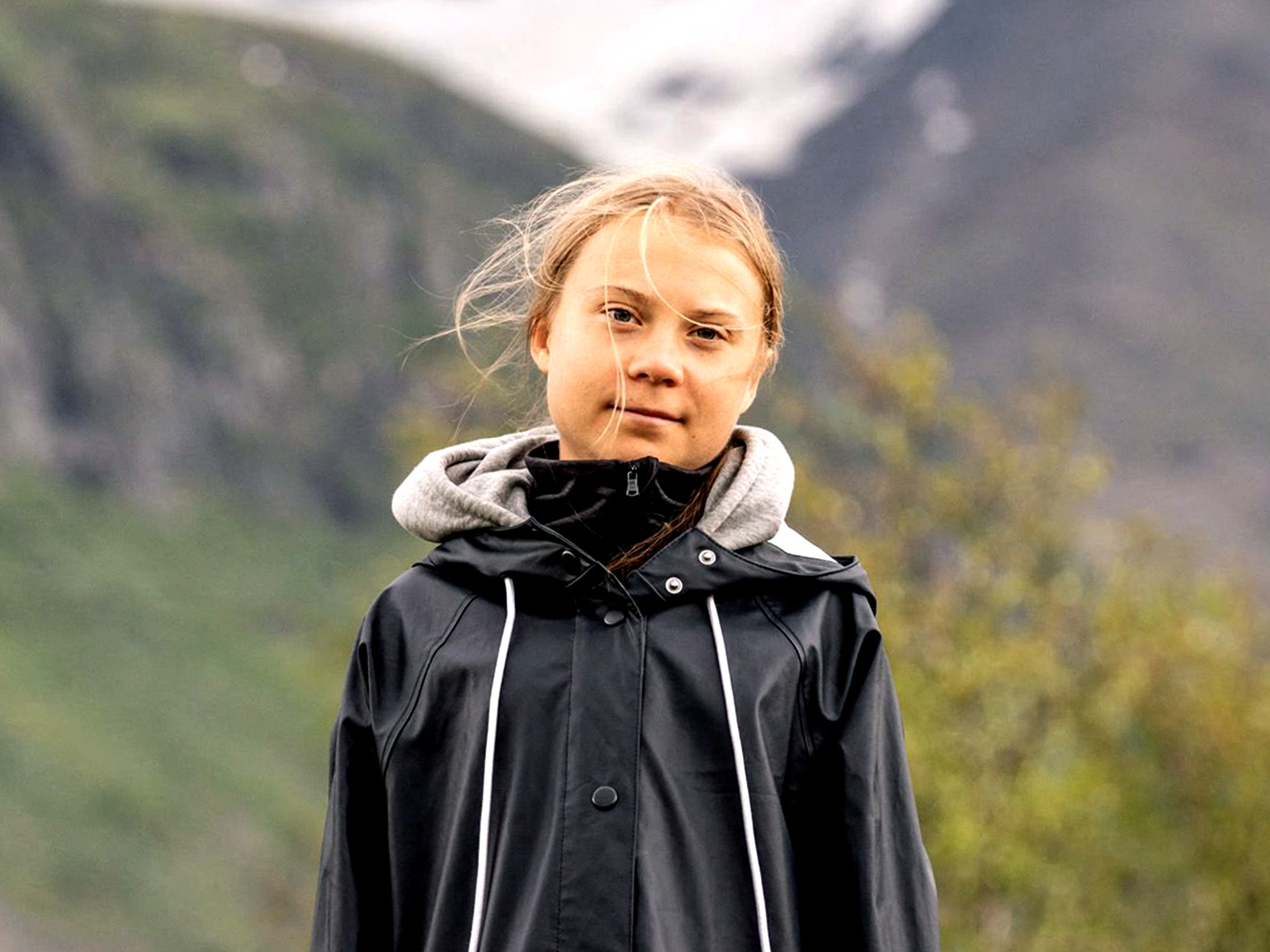
Given that no one else has done as much to help preserve life on Earth, it seems odd that Greta Thunberg seemed not to have been invited to the Cop26 summit in Glasgow. In an interview with the BBC’s Andrew Marr, she admitted that she didn’t actually know if she was supposed to be there or not: “I don’t know. It’s very unclear. Not officially.”
As to why that might be, she could only hazard a rather shrewd guess: “I think that many people might be scared that if they invite too many radical young people, then that might make them look bad.” Certainly, the chair of the conference, the smoothiechops British cabinet minister Alok Sharma, a man so soporific he should be prescribed for chronic insomnia, is the very opposite of the impassioned, urgent and famously direct Thunberg. With her encouragement of the likes of Extinction Rebellion, she might indeed cause a stir, and spoil the calm progress of international environmental diplomacy towards the inevitable bromides, but she’d be making trouble wherever she might happen to be. It is, after all, what she has been doing almost non-stop in the mere three years since she embarked on her mission to save her fellow 7.9 billion citizens of the world.
Some world-famous public figures – Joe Biden, the Queen, Angela Merkel – are celebrated for their longevity: Thunberg is remarkable for her youth and her meteoric progress across our polluted skies. She turned 18 last January, and thus eligible to vote for the first time in her native Sweden (not that she places much confidence in politicians anywhere). It was only on 20 August 2018 that she decided to organise her one-girl “SKOLSTREJK FOR KLIMATET” and sit down in front of the Swedish parliament until elections the following month, in order to encourage her country to live up to its obligations under the 2015 Paris Agreement. (She pointed out at the time that, contrary to its right-on image, prosperous industrial Sweden had one of the higher rates of greenhouse gas emissions per capita – a typical example of her attention to the details of her argument.) The revolution began with a tweet: “We kids most often don’t do what you tell us to do. We do as you do. And since you grown-ups don’t give a damn about my future, I won’t either. My name is Greta and I’m in ninth grade. And I am school striking for the climate until election day.”
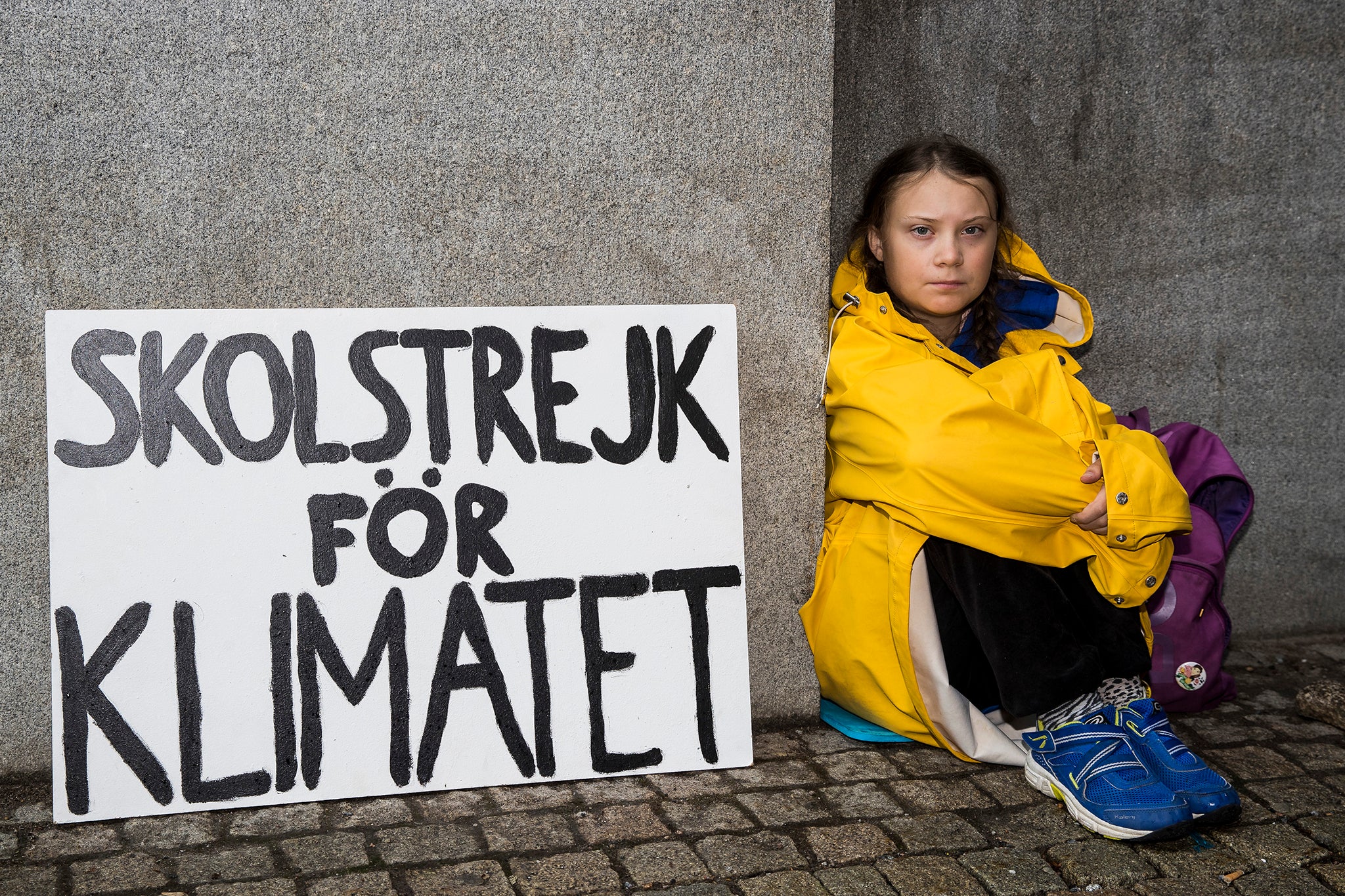
She kept the strikes up after polling day, and they spread and spread, as did her reputation. Greta took a sabbatical to take her struggle global. Not long after her lone protest, she found herself addressing the United Nations, being belittled by the president of the United States, and patronised by the president of the Russian Federation. Donald Trump told her to go the movies; Vladimir Putin advised her the world was more complex than she supposed. The attention suited her. She became one of the few personalities in the world to be known simply by their first name, and the “Greta Effect” was now a thing: “A year before my UN speech the thought of seeing pictures of myself everywhere would have been unthinkable.”
There was some irony in this. As Thunberg tells it, she was inspired by the school strikes organised by a couple of female pupils in Florida after the Parkland massacre in March 2018, part of a wider wave of revulsion about lack of gun control (17 students had died in the shootings). Talking it over with her friends, they thought it might be an a idea to do the same for the climate, given the wildfires and freakish weather in Sweden that summer. Yet, in the event only Greta actually turned up at the Riksdag, and, contrary to some of the casual insults lobbed at her later on, she conscientiously took her schoolbooks along to continue her studies while quietly protesting, apparently with no great dreams of global celebrity. It was simply something she felt driven to do.
Her sense of vocation was spurred when she watched a film about climate change when she was eight or nine, and she, so thoughtful even at that age, couldn’t work out why the world was apparently going to come to an end unless something was done, and yet nothing was being done about it, which must mean that it wasn’t as big a deal as the film made out. Then she started looking at the facts, and learning about the science. When she was that age, she says, she thought she would end up as a scientist: “When I was younger, I pictured my future being some kind of scientist, working in a lab, never seeing the daylight, that’s what I thought… but it didn’t really turn out like that”.

The turning point in her life and that of her family was in a sense accidental, when she became quite dangerously ill soon after she became interested in climate change, and concerned about it. It was obviously a traumatic time for her, for her father, Svante, an actor, for Greta’s sister, Beata, three years Greta’s junior, and for her mother Malena Ernman, an opera singer. Greta almost didn’t make it through this formative experience.
Svante and Malena married in 2004, not long after Greta Tintin Eleonora Ernman Thunberg came into their lives. A few years ago Ernman wrote a memoir with the family about their life (Our House Is on Fire: Scenes of a Family and a Planet in Crisis). Before the illness they had enjoyed an idyllic comfortable home life, with a Volvo estate packed with dogs and dolls houses and teddy bears and tricycles. It was a civilised life, fully of creativity and a busy house, but with Svante and Melena making as much time for each other and their daughters as they could with their travel and work commitments. It was all to change quite dramatically.
Ernman wrote: “One evening in the autumn of 2014, Svante and I sat slumped on our bathroom floor in Stockholm. It was late, the children were asleep. Everything was starting to fall apart around us. Greta was 11, had just started fifth grade, and was not doing well. She cried at night when she should be sleeping. She cried on her way to school. She cried in her classes and during her breaks, and the teachers called home almost every day. Svante had to run off and bring her home to Moses, our golden retriever. She sat with him for hours, petting him and stroking his fur. She was slowly disappearing into some kind of darkness and little by little, bit by bit, she seemed to stop functioning. She stopped playing the piano. She stopped laughing. She stopped talking. And she stopped eating…”
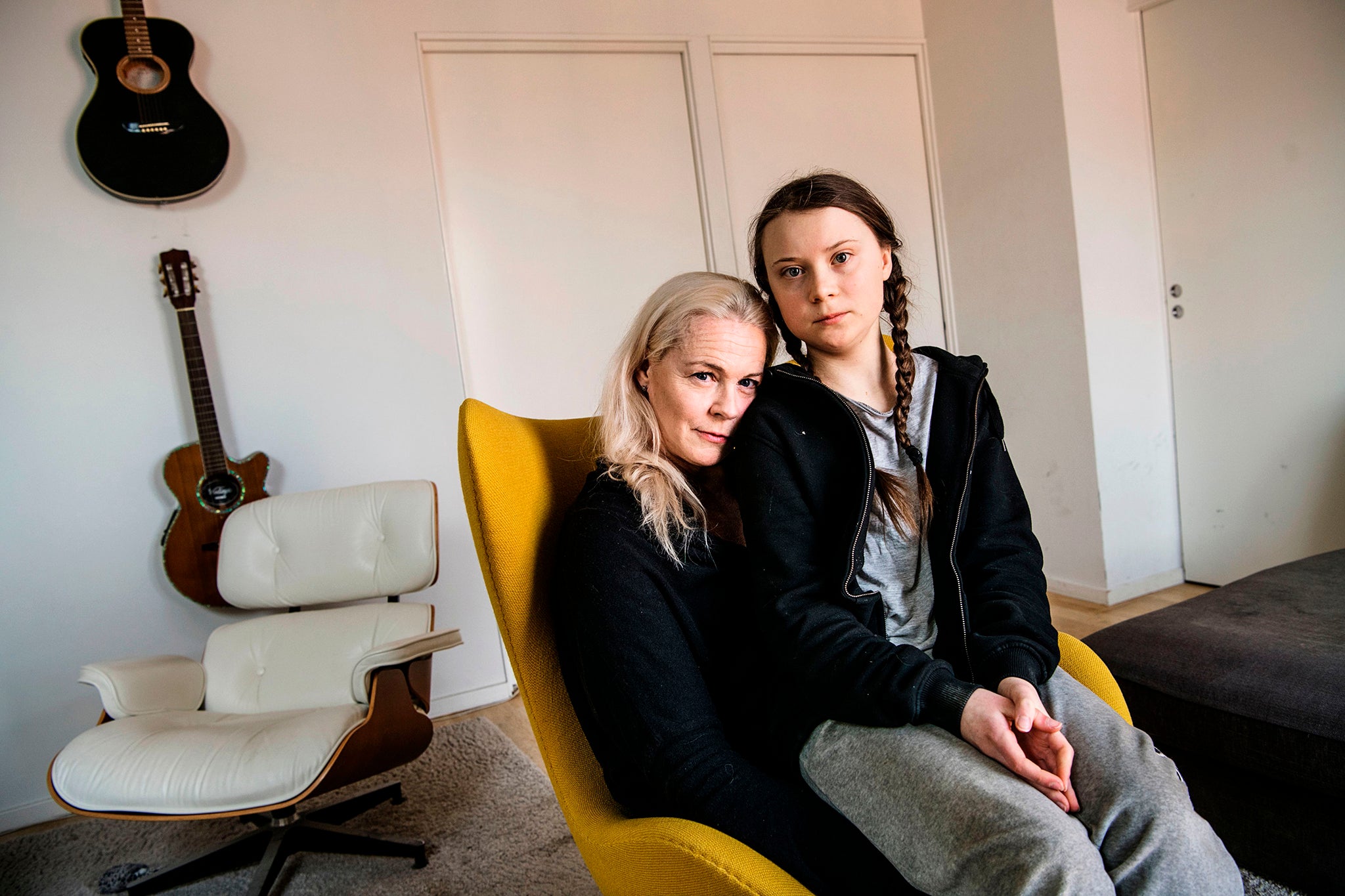
Malena and Svante had to give up work, cancel contracts and concentrate full-time on their ailing daughter, who would barely speak to anyone outside the family. They had literally to spoon-feed the emaciated Greta back to health, morsel by morsel, in between her panic attacks, one lasting a screaming 40 minutes. In due course there is a kind of relief in Ernman’s account when the school psychologist diagnoses autism, specifically high-functioning Asperger’s syndrome with OCD and selective muteism. Then Greta opened up, and presented her parents with her own memoir of being bullied at school, which Melana later recounts: “She devotes the whole Christmas break to telling us about unspeakably awful incidents. It’s like a movie montage featuring every imaginable bullying scenario. Stories about being pushed over in the playground, wrestled to the ground, or lured into strange places, the systematic shunning and the safe space in the girls’ toilets where she sometimes manages to hide and cry before the break monitors force her out into the playground again. For a full year, the stories keep coming. Svante and I inform the school, but the school isn’t sympathetic. Their understanding of the situation is different. It’s Greta’s own fault, the school thinks; several children have said repeatedly that Greta has behaved strangely and spoken too softly and never says hello.”
Remember that all this is very recent, and not yet 10 years ago; yet the Greta who remarks that “all my life I’ve been the invisible girl” is now one of the most recognisable faces in history, a Time magazine person of the year, and near-miss Nobel Peace Prize nominee (surely only a matter of time before she wins it). She doesn’t always find the fuss and the selfies and the death threats easy to deal with, and “sometimes it gets overwhelming, and because you’re autistic, even more” – but “it’s something I have to accept”.
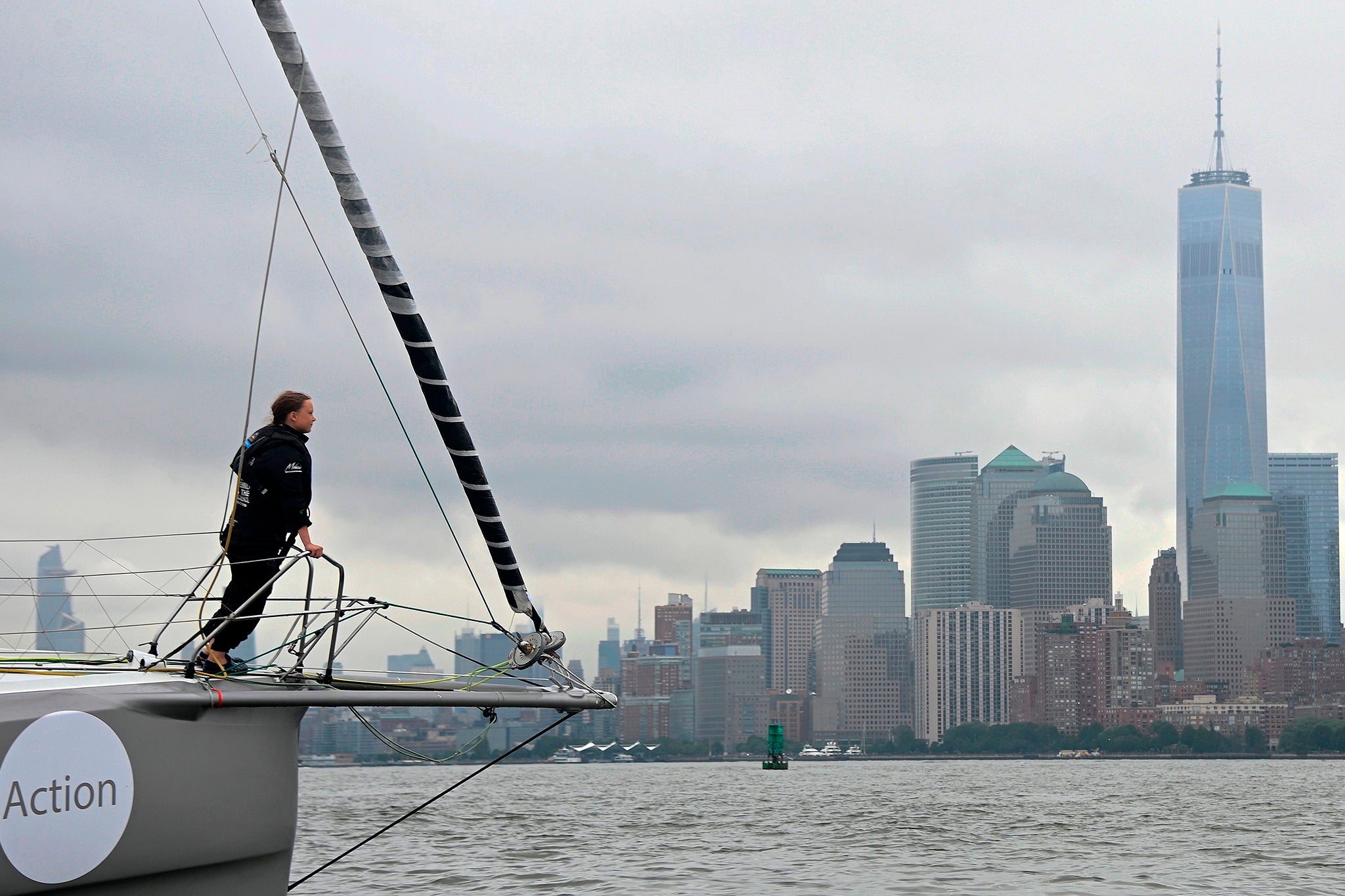
Her family continues to be supportive, even though Greta now lives in her own apartment and has established her own open and transparent charitable foundation for her work and other good causes. It’s where she channels the various prize funds she collects. A BBC fly-on-the-wall documentary earlier this year followed her campaigning around the world. It included memorable footage of her scramble to find a sailing yacht to cross the Atlantic after the Cop25 conference in 2019 had to be transferred to Madrid because of civil unrest in the original host nation, Chile (flying to Europe being out of the question). Svante was ever-present in the film, lugging the suitcases, driving the Tesla, fiddling with the PC, driving the Tesla – but is ordered by Greta to stay out of public view, and off the marches. He is uncomplaining, but candid about life on the road with his prodigy of a daughter: “There’s been some dark moments. In these moments I’ve told her, you know, you want to do this then you do it. If you don’t, we go home now.”
But why? Why is it Greta, alone among precocious adolescents concerned about the climate crisis who became the leader of a powerful global mood and movement for change?
She’s very, very driven. She doesn’t want to waste any time. She reads a lot of books, of articles on science
First, she made it her duty to understand the science. In this task she has been enabled by her autism – by her own witness it has been a “secret weapon”. With Asperger’s, she has been able to focus on one challenge for years without getting bored. She is admirably, astonishingly clear-sighted about what is happening – or not happening – to prevent uncontrollable, catastrophic climate change. She has no time at all for far-off targets decades away for “net zero” and the like, rightly recognising that they are at best unenforceable and at worst dishonest. She prefers the simpler notion of a sort of CO2 allowance, a “carbon budget” – the 400 gigatonnes of CO2 left for the world to spew into the atmosphere, after which disastrous climate change cannot be stopped. At current rates the “budget” will be gone in about five to 10 years, after which it is simply too late to do anything beyond doubtful mitigations. She therefore demands action now, not “by” 2040 or 2050, far too distant to invite urgency, and her logic is unanswerable.
This deep comprehension of the deep danger to humanity gives her all the motivation she needs to push herself on. Her father explains: “She’s very, very driven. She doesn’t want to waste any time. She reads a lot of books, of articles on science.”
Second, she is indeed smart – in the Trump sense too of being sassy. For example, partly out of deep conviction, but surely conscious always of the lazy charge of hypocrisy and the conspiracy theories her many enemies would love to level against her, she never flies, she consumes little if any meat and dairy, and she pays her own way. She practises what she preaches. Earlier this year she declared she would not be coming to Cop26 because of the way developing countries had been deprived of the Covid vaccine; now that she’s satisfied that everyone arriving is properly inoculated she’s in town. The management of her personal arrangements is punctilious. She stated a couple of years ago: “My parents pay for tickets and accommodation. I am not part of any organisation. I sometimes support and cooperate with NGOs that work with the climate and environment. But I am absolutely independent and I only represent myself. And I do what I do completely for free, I have not received any money or any promise of future payments in any form at all.” Some politicians could learn from that uncomplicated code of conduct.
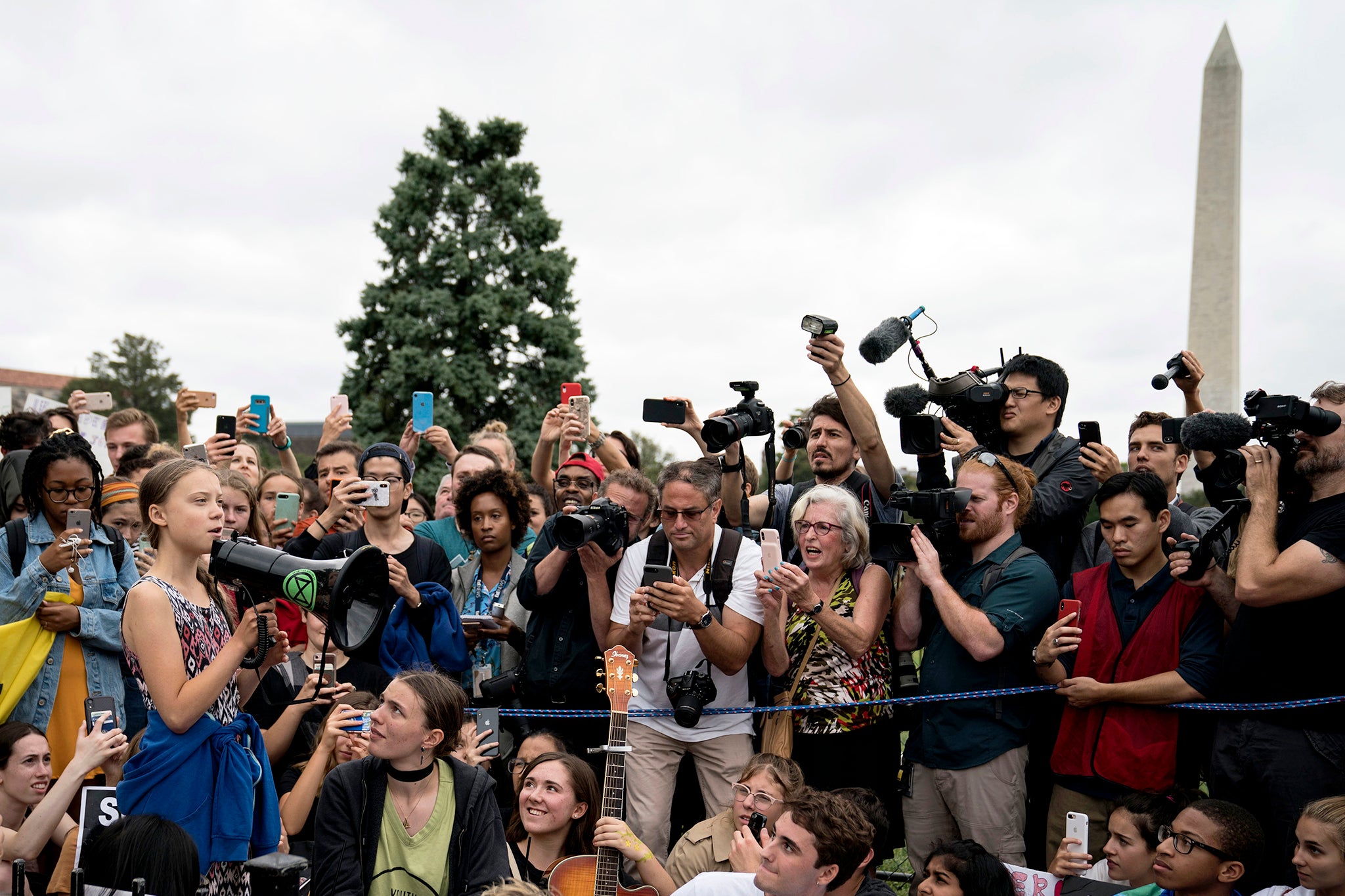
Then there is the sheer quotability of Greta Thunberg – she has a natural talent for framing an argument and phrase making, and she doesn’t mind deploying it. Like a rockstar she has a string of platinum hits: “How dare you!”; “I want you to act as if our house is on fire”; “I have learned you are never too small to make a difference”; “I want you to panic”; “All political and economic systems have failed. But humanity has not failed yet.” Most recently she took a nice swipe at Boris Johnson – “blah, blah, blah”. Best of all was probably her magnificent indignity, aged 16, at the empty promises she had to sit through at the UN Climate Action Summit in New York: “My message is that we'll be watching you. This is all wrong. I shouldn’t be up here. I should be back in school on the other side of the ocean. Yet you all come to us young people for hope. How dare you. You have stolen my dreams and my childhood with your empty words. Yet I am one of the lucky ones. People are suffering.“
That was the occasion when the famous photograph was taken of her frowning with burning intensity at a conceited-looking Trump, the very embodiment of climate denial and betrayal. It prompts a further thought. Consciously or not, Greta Thunberg has made a true icon – dread word – of herself. Like any celebrity she has an image, albeit born unselfconsciously of her own consistent tastes and habits: the slight frame, surrounded so often by porcine powerful men or engulfed in some frenetic media scrum; the Scandi-chic look of her clothes; the pigtails; the home-made school strike placard; her extreme youth. Recently she has taken to “rickrolling”, and bopping around to Rick Astley’s hit single, and of course we know she’s never going to give up on the Earth. She is recognisable just from her accent or her silhouette, a rare distinction.
She is charismatic, and stylish, or anti-stylish, and it comes from her authenticity. Still, it might not be a coincidence that she comes from a family of performers – operatic mum, acting dad, her sister is a singer and her paternal grandfather, Olof Thunberg, had the distinction of providing the voice for the Swedish character in the 1955 Disney animated classic Lady and the Tramp. Like any fine entertainer, she can hold an audience so well that they’re happy to be insulted by her – and then give her a standing ovation.

For many, fans and detractors alike, Thunberg has become a cult figure – “the Joan of Arc of climate change”; “Saint Greta”, the girl who is saving the planet, or a depressing doom-monger playing truant. Ricky Gervais told his Golden Globes audience a few years ago: “You know nothing about the real world. Most of you spent less time in school than Greta Thunberg.”
Thunberg herself, typically, has a much more clear-sighted idea of herself, and she is actually her own worst (ie sharpest) critic. She knows that whatever else she has done, she has not succeeded in changing things. She knows her shortcomings, which is refreshing. She said in 2019, before the last Cop: “People are only listening to the emotional bits like ‘how dare you’ and ‘I want you to panic’ and so on. I say these things because they get people’s attention, and now I have people’s attention I don’t need to make a speech like that. I want them to listen to the actual content, and the science.”
She knows she does not have the answers. To those who say her protests and marches and speechifying is a waste of time – she sadly agrees. Her point is that “wherever I go I seem to be surrounded by fairytales. Business leaders, elected officials from across the spectrum spending their time making up and telling bedtime stories that soothe us, that make us go back to sleep”. In a new video on her Twitter account for Cop26 she is asked by a mock interviewer: “How are we going to solve the climate crisis?”
She answers: “Just the fact that this question is asked to me, a teenager, over and over, is absurd, but not as absurd as the fact that the climate and ecological emergency is being reduced to a problem that needs to be fixed. This is the biggest crisis that humanity has ever faced. We demand a safe future. Is that really too much to ask?” It ain’t.
Join our commenting forum
Join thought-provoking conversations, follow other Independent readers and see their replies
Comments
Bookmark popover
Removed from bookmarks